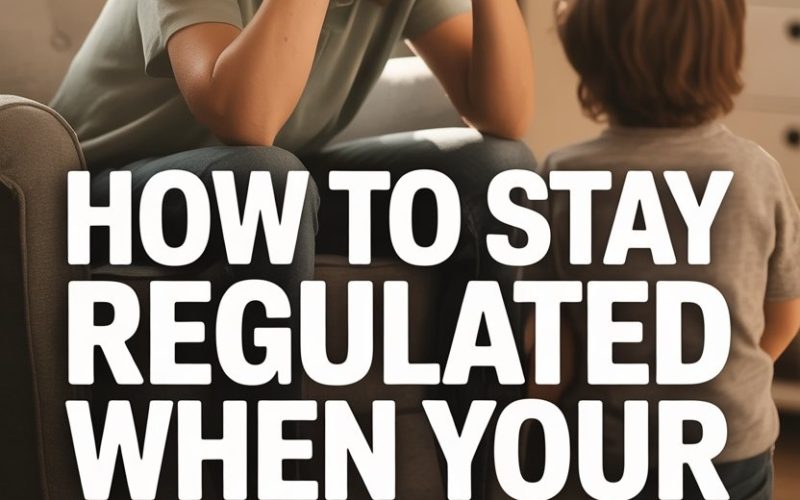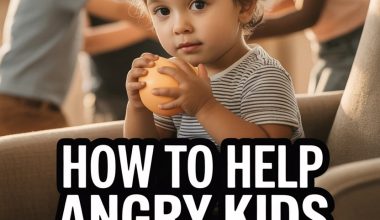No one tells you, when you become a parent, that you’ll need the patience of a Buddhist monk, the flexibility of a Cirque du Soleil acrobat, and the emotional regulation skills of a seasoned therapist—especially when your child has ADHD.
If your little whirlwind seems to have a sixth sense for pushing you right to the edge just before school drop-off or bedtime, you’re not alone.
Here’s how to keep your cool (or at least not completely lose your marbles) when your ADHD kid is at peak chaos.
Your Calm Is Contagious (Even if It’s Faked)
Kids with ADHD are emotional barometers. If you’re frazzled, their behaviour will often escalate—sometimes faster than you can say “where did I put my coffee?”
That doesn’t mean you need to be Zen incarnate. Faking calm still counts!
When you keep your tone steady and your face relaxed—even if you feel anything but—it helps to anchor your child’s emotions.
A study published in the Journal of Child Psychology and Psychiatry found that children are more likely to self-regulate when their caregivers maintain a calm presence.
No, this doesn’t mean you’ll suddenly develop superhuman serenity, but it does mean you might want to practice your best poker face.
Microbreaks: The Lifeline for Frazzled Parents
When things are spiralling—breakfast on the walls, shoes on the wrong feet, child under the table—sometimes the best regulation tool is a 60-second reset. Microbreaks can be a gamechanger.
Step into the pantry. Breathe. Text a fellow parent an “SOS” meme. Sip your lukewarm tea with the dedication of someone at a wine tasting.
Dr. Mark Bertin, developmental paediatrician and author, swears by these mini-pauses, explaining they give your nervous system a chance to reset before you re-enter the fray.
You probably won’t come out enlightened, but you might be 10% less likely to lose it, which counts as a win.
Lower the Bar, Not Your Standards
When your child is ping-ponging across the lounge, it’s tempting to clamp down harder. Instead, experts recommend picking your battles ruthlessly.
Is today the day to insist on matching socks? Probably not. Will the world end if dinner is a cheese toastie and some carrot sticks? Unlikely.
Lowering the bar isn’t giving up; it’s strategic survival. Clinical psychologist Dr. Sharon Saline points out that on tough days, your goal is connection, not perfection.
Try to focus on one or two non-negotiables (say, no hitting or “the guinea pig stays in the cage”), and let the rest slide.
The Magic of Predictable Routines (Even If They’re a Bit Wobbly)
ADHD brains thrive on structure, but that doesn’t mean your house needs to run like a Swiss train schedule. Even a loose routine helps anchor everyone’s nerves.
You could draw a cartoon bedtime chart for your child, or play the same song every morning to signal teeth brushing time. The goal isn’t rigidity—it’s predictability.
A 2022 meta-analysis published in Pediatrics found that consistent routines improved both parent and child stress levels in families dealing with ADHD.
Nobody’s grading you for artistic merit if your “routine chart” looks like modern art. Kids respond to cues and consistency, not Pinterest-worthy visuals.
Breathe Like a Yoga Instructor, Swear Like a Pirate—But Do It Quietly
Breathing exercises sound cliché—until you use them in the throes of a meltdown and discover they actually work.
Box breathing (inhale for four, hold for four, exhale for four, hold for four) is simple enough to do mid-chaos and doesn’t require a yoga mat or incense.
If you need to mutter a string of creative expletives under your breath while you do it, join the club (just make sure little ears are out of range). Deep breathing lowers cortisol and helps you think before you react.
Some parents even model this for their kids: “Mum’s going to take a few breaths so she doesn’t explode like an angry volcano.”
Tag in Your Support Team—Yes, Even If It’s Just the Dog
Parenting a child with ADHD is not a one-person job, even if it sometimes feels that way.
Whether it’s a partner, grandparent, mate, or the teenager next door who’ll swap babysitting for cash, there’s no shame in handing off when you’re spent.
Research consistently shows that parents who lean on their support network report lower stress and more patience.
No support team handy? Even a phone call to a sympathetic friend can give you enough of a breather to get through the next round.
Humour: The Most Underrated Parenting Tool
Nothing kills a power struggle faster than a well-timed joke or an exaggerated “Oh no, not the sock monster again!” That deadpan wit you wielded in your twenties? It’s gold now.
Laughter resets your nervous system, lightens the mood, and often helps your child shift gears.
Dr. Laura Markham, parenting coach and author, champions humour as a “secret weapon” with ADHD kids. It’s not about minimising your child’s feelings; it’s about keeping things light enough that you both survive the sticky moments.
Know Your Triggers Like You Know Where the Hidden Snacks Are
Everyone has situations that set them off. Maybe it’s the shriek that comes just as you’re parking the car, or the neverending saga of the lost shoe.
The more you can spot your triggers, the better chance you have at heading off your own emotional spiral.
Try jotting down the situations that regularly wind you up. Once you see the patterns, you may be able to create pre-emptive strategies.
For example, earbuds in the car for your child’s favourite audiobook can save your sanity on the school run.
Self-Care: Not Just Bubble Baths and Inspirational Quotes
You know the cliché: “Put on your own oxygen mask first.” For parents of kids with ADHD, that’s not spa advice—it’s basic survival.
Self-care doesn’t need to be elaborate. Ten minutes on the phone with a mate, a walk around the block, or even a trashy TV show after bedtime can boost your reserves.
The science backs this up. A study in The Journal of Attention Disorders found that parental stress reduction interventions (even very brief ones) improved outcomes for both parents and kids.
The world won’t grind to a halt if you take a break. You don’t even have to feel guilty—doctor’s orders!
Strategic Use of Tech (No Guilt Required)
Screen time can be a double-edged sword, but on tough days, a well-timed episode of Bluey or a kid-friendly meditation app like Smiling Mind can buy you the precious minutes you need to regroup.
Set expectations upfront (“After this show, we’ll tidy up together”), then use the window for your own mini-reset.
There’s no parenting trophy for doing it all without help. Dr. Russell Barkley, renowned ADHD expert, says using tech as a tool—rather than an all-day babysitter—can keep everyone regulated during high-stress times.
The Power of “Do-Overs”
No parent handles every meltdown with grace. Sometimes you shout. Sometimes you say something regrettable. That’s normal. What matters most is what happens next.
Try a “do-over.” Apologise. Model what you wish you’d done: “I lost my cool earlier. Next time, I’m going to pause and take a breath. Want to try it with me?”
Not only does this build trust with your child, but it also shows them that everyone is learning, even grownups.
When to Call in the Professionals
If you find yourself on the edge more often than not—snapping at your child, struggling to get through the day, or feeling hopeless—there’s zero shame in reaching out for backup.
A therapist, paediatrician, or support group can provide strategies and reassurance. Sometimes just talking to someone who gets it is enough to help you hang on.
Organisations like CHADD (Children and Adults with Attention-Deficit/Hyperactivity Disorder) offer resources, helplines, and parent groups. You’re not alone, and you don’t have to figure it out on your own.
From Surviving to Thriving
Raising a child with ADHD is not for the faint of heart. It asks more of you—more patience, more creativity, more resilience—than you ever expected to give.
Some days, “staying regulated” means you didn’t shout, you remembered to eat, and you made it to bedtime with everyone relatively intact. That’s not failure. That’s superhero territory.
The next time your little tornado is in full force and you feel your own emotions teetering on the edge, remember: even the best parents get dysregulated sometimes.
What matters is how you come back from it. Breathe, laugh, lower the bar when you need to, and accept every ounce of help you can get.
Parenting is a team sport, and you’re already doing better than you think.




